
|
Astronomy Picture Of the Day (APOD)
 Beefing Up the International Space Station
Beefing Up the International Space Station
17.12.2002
The International Space Station (ISS) will be the largest human-made object ever to orbit the Earth. The station is so large that it could not be launched all at once -- it is being built piecemeal with large sections added continually by flights of the Space Shuttle.
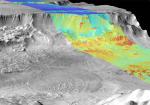 Night and Day in Melas Chasma on Mars
Night and Day in Melas Chasma on Mars
16.12.2002
What types of terrain are found on Mars? Part of the answer comes from thermal imaging by the robot spacecraft 2001 Mars Odyssey currently orbiting Mars. The above picture is a superposition of two infrared images, a black and white image taken during Martian daylight and a false-color image taken at night.
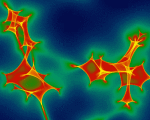 A Network of Microlensing Caustics
A Network of Microlensing Caustics
15.12.2002
A virtual sky map like this would be of interest to astronomers studying gravitational microlensing. In microlensing, the gravity of stars near the line of sight can act to magnify the light of background objects such as distant stars, or quasars. Nowhere is this magnification greater than near a gravitational lensing caustic.
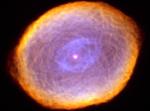 IC 418: The Spirograph Nebula
IC 418: The Spirograph Nebula
14.12.2002
What is creating the strange texture of IC 418? Dubbed the Spirograph Nebula for its resemblance to drawings from a cyclical drawing tool, planetary nebula IC 418 shows patterns that are not well understood. Perhaps they are related to chaotic winds from the variable central star, which changes brightness unpredictably in just a few hours.
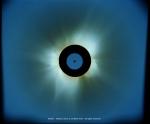 The Crown of the Sun
The Crown of the Sun
13.12.2002
During a total solar eclipse, the Sun's extensive outer atmosphere or corona is an awesome and inspirational sight. Yet the subtle shades and shimmering features of the corona that engage the eye span a brightness range of over 10,000 to 1, making them notoriously difficult to capture in a photograph.
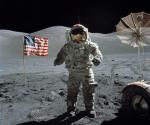 Apollo 17: Last on the Moon
Apollo 17: Last on the Moon
12.12.2002
In December of 1972, Apollo 17 astronauts Eugene Cernan and Harrison Schmitt spent about 75 hours on the Moon, in the Taurus-Littrow valley, while colleague Ronald Evans orbited overhead. Near the beginning of their...
 Meteors Between Stars and Clouds
Meteors Between Stars and Clouds
11.12.2002
Streaking high above diffuse clouds -- but well in front of distant stars -- are sand-sized bits of an ancient comet: meteors. These bits flaked off Comet Tempel-Tuttle during its pass through the inner Solar System about 150 years ago. Far in the background are stars toward the constellation of Ursa Major.
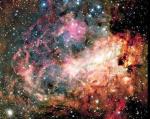 M17: Omega Nebula Star Factory
M17: Omega Nebula Star Factory
10.12.2002
In the depths of the dark clouds of dust and molecular gas known as M17, stars continue to form. The similarity to the Greek letter capital Omega gives the molecular cloud its popular name, but the nebula is also known as the Swan Nebula, the Horseshoe Nebula, and M17.
 Moon Shadow Moves Over Africa
Moon Shadow Moves Over Africa
9.12.2002
When the Moon's shadow reached out and touched the Earth last week, the result was a solar eclipse. Such an eclipse is total only for observers located along a narrow path corresponding to the ground track of the shadow's dark central portion or umbra.
 The International Space Station Expands Yet Again
The International Space Station Expands Yet Again
8.12.2002
The developing International Space Station (ISS) has changed its appearance yet again. Earlier this month the Space Shuttle Endeavor visited the ISS and installed the fourth of eleven pieces that will compose the Integrated Truss Structure. The new P-1 Truss is visible on the left, below the extended solar panels.
|
January February March April May June July August September October November December |
|||||||||||||||||||||||||||||||||||||||||||||||||